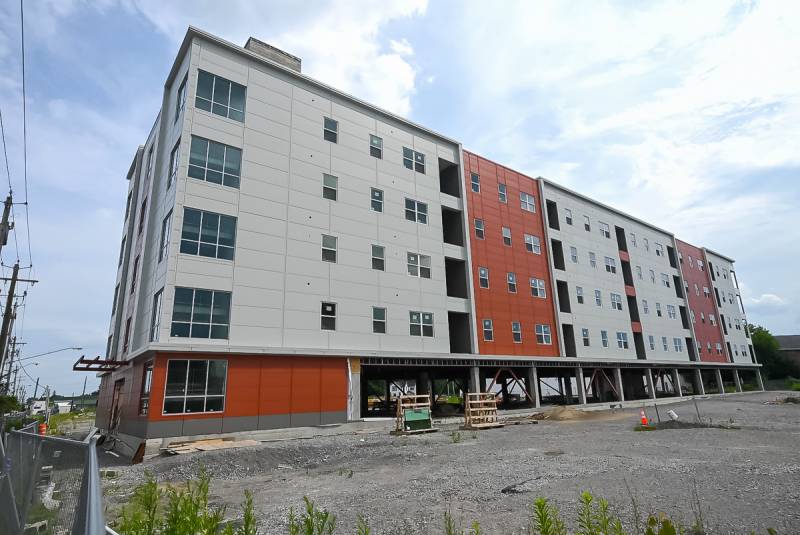While local officials decline comment, Savarino blames GCEDC for stall in Ellicott Station development

There are events and projects that happened in Batavia years ago that folks talk about, question, and criticize to this day. Urban Renewal and the destruction of downtown’s grand buildings in lieu of more modern structures such as Genesee Country Mall has been a big one.
Ellicott Station, the four-floor apartment complex that has been stalled now since summer of 2023, is another of those projects begging questions of how it came to be a visual doorstop in the middle of downtown Batavia.
And The Batavian has attempted to conduct forensic research and interviews to look back at all that took place leading up to the standstill, not to belabor the point but to establish and document the transactions as matters of historical importance, just as records about the mall-turned-Batavia City Centre are important to understand for anyone wanting to move forward.
The Batavian first assembled a timeline based on public documents of involved agencies -- the city of Batavia, Genesee Economic Development Center, and NYS Housing and Community Renewal. In addition to contracts and reports, The Batavian received hundreds of emails from key stakeholders such as City Manager Rachael Tabelski, GCEDC CEO Mark Masse and former CED Steve Hyde, HCR officials, and Ellicott Station property owner Sam Savarino. After the publication of those findings, The Batavian requested interviews with Tabelski, Masse and Savarino about the project, and Tabelski and Masse declined to discuss the issue further.
“Thank you for your inquiry. I have no further comments on the timeline. Right now, the City is doing its job to address code violations on the property and doing all we can to see this parcel redeveloped,” Tabelski said. “Along with the BDC, we continue to try to connect interested developers, not only with the stalled apartment building but also the DellaPenna building, which is a separate parcel.”
Masse appreciated The Batavian reaching out and our interest in this story, he said.
“The GCEDC is no longer involved in this project, and I have no comment on the story,” he said.
Savarino did answer a few questions and provided a document with additional details regarding a prior communication with GCEDC that he believes further validates his claim that the agency cost him and the community the project’s timely completion.
So where are we now is that Ellicott Station is swinging in the wind, so to speak? City officials have said a couple of developers have expressed interest, and The Batavian is aware of an unofficial list of prospective developers.
Are you or have you been working with any developers about potentially taking over the project?
"Yes,” Savarino said. “Ellicott Station LLC has communicated and continues to communicate with potential successor sponsors for the residential portion of the project.”
What do you think went wrong with this deal? And who do you believe bears the responsibility for that complex sitting idle?
“As your recent reporting indicates, the actions of the GCEDC disabled the project. The Ellicott Station project – both the commercial and residential components – are not feasible without the GCEDC benefits,” Savarino said. “The sponsor and funders would not have proceeded with the project without the GCEDC inducement. The GCEDC’s breach of its agreement preceded and precipitated any alleged non-performance of the sponsor.”
Do you have hindsight about what you could have done differently for another outcome?
“No.”
Do you think GCEDC could have done something different?
“Yes – not disable the project,” he said.
Was it a matter of a misunderstanding or something deeper? If so, what?
“The documents and correspondence between the parties speak for themselves,” he said.
Do you agree that the misusage of low income, workforce and affordable may have played a part in all of this for a misunderstanding between you and GCEDC/Batavia?
“There ought not to have been any misunderstanding,” Savarino said. “The documents and correspondence between the parties and the GCEDC’s own documents make clear the nature and details of the project (in particular the residential component) approved by GCEDC — whatever brand or description someone may attach to it.”
Where are you currently with the project, and are you working with HCR, other agencies/municipalities and developers to get Ellicott Station moving again?
“Yes; however, the actions of the GCEDC have presented significant hurdles, disabled and impeded the project and added significant cost,” he said.
Savarino has stood by his sign-off to GCEDC then-President Steve Hyde in March 2023 in that “we are committed to making this project a success by every measure,” and contends that the only reason that has not happened to date is because EDC pulled back its offer, hamstringing Savarino’s financial abilities and overall efforts to move forward.
He provided The Batavian with his own copies of documents received by The Batavian in its Freedom of Information Law requests as proof that he complied with every request from the industrial development agency, such as demographics about the 102 applicants — 82 were from Genesee County, eight from Orleans County, three from Erie, two from Wyoming, one from Bronx, two from Queens, and one each from Livingston, Monroe and out of state counties — to the number of 20 people receiving disability benefits, 31 people being 55 or older and 19 being 62 or older.
There were details about how actual tenancy would work, including orientation and that it would cover an explanation of the terms and conditions of the lease agreement, rules and regulations, a demonstration of how appliances and equipment operate, information about community services, medical facilities, shopping areas, public transportation and such, explanation about energy conservation measures and about resident participation/cooperation in operational programs with trash and recycling, fire safety drills, snow removal, etc.
There were also topics for employees about how to handle grievances on site, termination of leases and evictions, security, insurance, locks and keys, utilities, payment of rent, criminal activity and smoking, routine inspections, and pets.
One letter from consultant Divitta Alexander to both Hyde and Savarino, dated Nov. 22, 2019, cited income ranges of $9 to $15.55 per hour for a one-bedroom apartment and $10.26 to $17.64 per hour for two-bedroom units. These hourly rates “would qualify for the project at the rents that both HCR and the market analyst expressed comfort with,” Alexander said.
“I think the project is properly characterized as mixed-use workforce housing,” Alexander said.
In an example used by The Batavian for a prior article published after the income levels were publicized by Ellicott Station LLC, two people each earning minimum wage, $14.20 an hour, were not eligible for a two-bedroom apartment at Ellicott Station because they would be earning too much (the maximum household income for two people in a two-bedroom apartment is $34,600, and two people working full-time at $14.20 would gross $59,072).
So, the numbers seem off in 2019. At $9 per hour, that could arguably be reasoned as lower income, with a $17,550 gross income per year, given the 37.5 hours per week, according to Alexander. Savarino has maintained that his understanding of the project’s target audience had not changed since the beginning, even though he used the term workforce with a reporter at least once.
As Savarino and Hyde continued to communicate about the project, Hyde expressed concern about the following issues:
- Will the updated brochure-ware better emphasize “Workforce Housing” and de-emphasize “Vouchers Accepted” in future communications all while remaining compliant with Fair Housing Laws?
- What does the on-site property management staff’s work schedule look like given domestic disturbance problems tend to occur in the evening after normal working hours?
- Is there any night coverage or ability to have a property manager live at Ellicott Station?
- It appears from the Tenant Selection Plan (attached) that fairly rigorous requirements will be effectuated that will confirm applicant incomes (hence, being employed) but discussion of preferences toward Genesee County residents weren’t addressed. Can you please clarify if that is a possibility?
- Will Savarino Companies commit to providing the Batavia City Manager and GCEDC President and CEO a copy of its annual report each year that includes housing achievements and occupancy statistics?
“I can confirm for you that there will be an office on-site that will be staffed for the day-to-day management of the facility, including timely responses to tenant needs for any maintenance as well as quality of living issues. During non-business hours when staff is not on site, there will be a direct, toll-free phone number and email for tenants to contact management with any off-hour issues or concerns,” Savarino said. “A safety plan will be developed that will meet all regulatory requirements and city codes in order to secure a certificate of occupancy for the building. Emergency exit signs, fire extinguishers and no smoking signs will be just some of the safety and health measures that will be installed and easily accessible and visible throughout the building. We will have interior and exterior video surveillance security cameras on the property at locations yet to be determined. The management office will have monitors to observe surveillance video in real time as well as record video for use if ever necessary. In addition, a state-of-the-art access system for tenants only will allow management to closely monitor who is entering the building.
“Savarino Companies will do all we can to make sure that Ellicott Station provides a safe and welcoming environment for residents and visitors, especially as we complete the construction of the retail structure and continue our efforts to secure a retail tenant or partner(s) to help make Ellicott Station a destination that is vibrant and has a positive economic impact on the City and region,” he said. “As you know, we are now advertising and accepting applications from individuals interested in tenancy. All applicants will be screened and will go through a rigorous vetting process within the bounds of New York State and federal law and regulation. Information on third party tenant screening systems that will be utilized for Ellicott Station were recently provided to GCEDC. As you may be aware we have conferred with the Genesee County Job Development Bureau and G.L.O.W. Workforce Development to actively reach out to prospective entry level workforce tenants who can take advantage of the quality, safe and proximate housing offered by Ellicott Station. Efforts will include revamped informational literature and participation in regional job fairs. We are also planning outreach to the senior community as Ellicott Station has much to offer independent seniors. We will share with you evidence of such outreach. (There was a color brochure with photos of workers and information about Ellicott Station distributed.)”
“You have requested specific information related to Savarino projects that are directly comparable to the Ellicott Station project. While Savarino has developed and constructed many mixed-use and residential projects including affordable housing projects and some providing affordable housing to senior, elderly, and special needs tenants we do not have a project that would directly to the Ellicott Station project,” he said. “We are happy to provide you what information we can on projects currently under Savarino management to the extent we can obtain sufficient formal assurance of confidentiality for any information provided and subject to approval of our counsel.”
There are several other documents, many of them quoted in the prior story, and Savarino believes that they put the blame squarely on the shoulders of GCEDC.
























